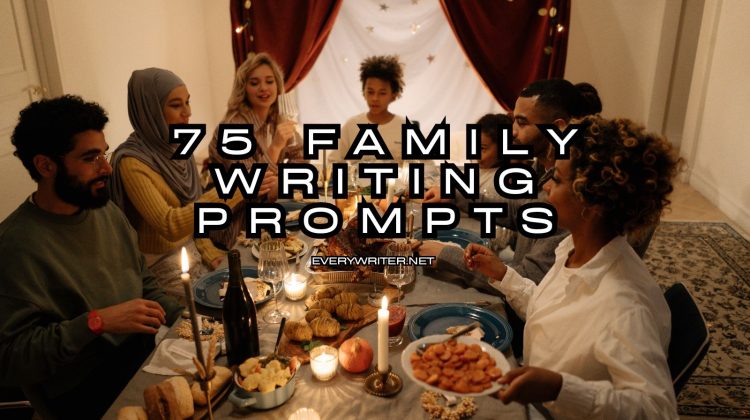75 Family Writing Prompts
Discover 75 thought-provoking family writing prompts designed to unlock your creativity and explore the complex dynamics of family relationships. Whether you’re a seasoned writer seeking inspiration or someone looking to document their family history through journaling, these carefully curated prompts will help you dive deep into the heart of what makes families unique, challenging, and beautiful. From exploring generational traditions to examining modern family dynamics, these writing prompts offer endless possibilities for storytelling and self-discovery.
Family relationships provide some of the richest material for writing, offering a tapestry of emotions, conflicts, and connections that span generations. These writing prompts touch on everything from childhood memories and family secrets to cultural traditions and evolving family structures. They’re perfect for creative writing projects, personal journals, family memoirs, or even as conversation starters during family gatherings. Each prompt has been crafted to encourage both reflection and storytelling, helping you uncover the extraordinary stories that lie within ordinary family moments.
What sets these family writing prompts apart is their versatility and depth. Some prompts focus on specific moments, like a memorable family dinner or a significant conversation, while others explore broader themes like family traditions, generational differences, and the impact of technology on modern family life. Writers can choose to respond with fiction or non-fiction, making these prompts suitable for various writing styles and purposes. Whether you’re writing for personal reflection, professional development, or creative expression, these prompts provide a solid foundation for exploring family dynamics through words.
The collection includes prompts that examine both the light and shadow sides of family life, acknowledging that family relationships can be sources of both joy and challenge. From exploring family secrets and unspoken rules to celebrating traditions and shared victories, these prompts create space for honest exploration of family experiences. They encourage writers to look beyond surface-level interactions and delve into the deeper currents that shape family bonds, making them particularly valuable for writers seeking to create authentic, nuanced portrayals of family life.
For teachers, writing group leaders, and workshop facilitators, these prompts serve as excellent tools for inspiring meaningful discussions and writing exercises about family. They can be adapted for various skill levels and purposes, from elementary school creative writing assignments to adult memoir workshops. The prompts are designed to spark creativity while maintaining sensitivity to diverse family structures and experiences, making them accessible and relevant for writers from all backgrounds. Whether used individually or as part of a larger writing project, these family-focused prompts provide a comprehensive framework for exploring one of life’s most fundamental relationships through the written word.
Why Write About Family?
Writing about family serves as both a mirror and a bridge – reflecting our deepest connections while building pathways to understanding across generations. When we put our family experiences into words, we’re not just documenting events; we’re preserving emotional legacies that might otherwise fade with time. Every family story written becomes a thread in the larger tapestry of human experience, offering insights that extend far beyond individual households.
Personal and family narratives help us process complex emotions, heal from past wounds, and celebrate cherished moments. Writing about family challenges us to see familiar faces in new lights, encouraging empathy as we explore different perspectives within our shared stories. When we write about our grandmother’s hands kneading bread or our father’s silence after work, we’re not just recording details – we’re capturing the subtle ways love, struggle, and resilience shape our family bonds.
Writing about family also serves a crucial historical purpose. In an age of rapid social change, our written family stories become valuable time capsules, preserving traditions, values, and ways of life that might otherwise be lost. These narratives help future generations understand their roots and provide context for their own place in the family story. Whether through detailed memoirs or simple journal entries, writing about family creates a bridge between past and present, helping us understand how we became who we are and inspiring reflection on who we might become.
Most importantly, writing about family can be deeply healing. It allows us to explore complicated relationships from a safe distance, understand intergenerational patterns, and find meaning in both the beautiful and difficult moments of family life. Through writing, we can honor our ancestors, reconcile with our past, and create a more intentional vision for our family’s future.
- Write about a small moment when you realized your parents were people beyond just being your parents. What triggered this realization?
- Describe your favorite family photograph. What was happening just before and after it was taken?
- Think about a family tradition that’s changed over time. How do you feel about these changes?
- Reflect on a time when you saw one of your siblings through someone else’s eyes. What did you notice?
- Write about something your grandparents say often. What does this phrase reveal about their life experiences?
- Describe the most memorable meal your family shared together. What made it special?
- Think about a time when your family surprised you with their response to a situation. How did this change your perception of them?
- What’s a skill or trait that runs in your family? How has it manifested differently across generations?
- Write about a difficult conversation you need to have with a family member. What’s holding you back?
- Describe your childhood home through the eyes of different family members. How might their perspectives differ?
- What’s a piece of advice from a family member that you initially dismissed but now understand?
- Write about a family story that gets told differently depending on who’s telling it. Which version do you believe?
- Reflect on a moment when you felt especially proud to be part of your family. What sparked this feeling?
- Describe the unspoken rules in your family. How did these rules develop?
- Think about a family member who’s changed significantly over the years. What do you think prompted these changes?
- Write about something you wish you knew about your family’s history. Why is this particular information important to you?
- Reflect on a family argument that actually brought you closer together. How did it lead to better understanding?
- Describe a time when you saw your parents comfort each other. How did it make you feel?
- What aspects of your family dynamic would you like to carry forward into your own future family? What would you change?
- Write about a moment when you realized you were becoming like one of your family members. How do you feel about this?
- Reflect on a family member’s habit that used to annoy you but now feels endearing. What changed?
- Describe a time when your family had to adapt to a major change. What did you learn about each other?
- Think about the roles different family members play during crises. How did these roles develop?
- Write about a family secret you discovered and how it affected your understanding of your family dynamics.
- Reflect on the different ways love is expressed in your family. How has your appreciation for these expressions evolved over time?
- Describe the morning routine in your family home. Which small details make it uniquely yours?
- Write about a family member’s laugh. How does the sound reflect their personality?
- Think about an object that’s been in your family for generations. What stories does it hold?
- Reflect on a time when a younger family member taught you something important. How did it change your perspective?
- Describe the car rides with your family. What conversations or moments stand out?
- Write about a family member’s hands – what do they tell you about their life?
- Think about the music that defines different generations in your family. How does it reflect each era?
- Reflect on a time when your family came together to support someone. What did you learn about collective strength?
- Describe the scents and smells you associate with different family members’ homes. What memories do they trigger?
- Write about a family gathering that didn’t go as planned but became memorable because of it.
- Think about the pets in your family. How have they shaped your family dynamics?
- Reflect on the nicknames in your family. What’s the story behind each one?
- Write about a family member’s career choice and how it influenced the family’s path.
- Describe the holiday you wish your family celebrated differently. What would you change?
- Think about the stories your family tells about you. How do they differ from your own memories?
- Reflect on a family member’s prized possession. What does it reveal about their values?
- Write about a time when cultural differences created friction in your family. How was it resolved?
- Describe your family’s relationship with technology. How has it evolved over the years?
- Think about the words of wisdom passed down through your family. Which ones resonate with you now?
- Write about a family member’s cooking and what it communicates about their love language.
- Reflect on the geographic distances in your family. How do they affect your relationships?
- Describe a family milestone that felt different than you expected. What surprised you?
- Think about the role of forgiveness in your family. How has it shaped your relationships?
- Write about your family’s attitude toward money. How has it influenced your own perspective?
- Reflect on the dreams your parents had for themselves. How do they compare to how their lives unfolded?
- Describe the first time you saw a family member as vulnerable. How did it change your relationship?
- Write about your family’s relationship with nature. Which outdoor spaces hold your shared memories?
- Think about a family tradition that died out. Why did it end, and do you miss it?
- Reflect on how your family handles silence. Are you comfortable with quiet moments together?
- Write about your family’s relationship with reading. Which books have been passed around and discussed?
- Describe how illness or healing is handled in your family. What remedies or rituals persist?
- Think about the languages spoken (or lost) in your family across generations. What has been preserved or forgotten?
- Reflect on your family’s relationship with art or creativity. How is imagination encouraged or suppressed?
- Write about a time when your family had to redefine what “family” means. What prompted this change?
- Describe the role of extended family in your life. How have these relationships evolved?
- Think about your family’s attitude toward education. How has it shaped different generations?
- Write about the clothes or fashion choices that define different family members. What do they reveal?
- Reflect on how your family celebrates personal achievements. Whose accomplishments get the most attention?
- Describe your family’s approach to mental health. How has this evolved over generations?
- Think about the role of sports or competition in your family. How does it bring you together or create tension?
- Write about your family’s relationship with religion or spirituality. How has it changed over time?
- Reflect on how your family handles major life transitions. Which ones were celebrated, mourned, or ignored?
- Describe the family stories that never get told. Why do you think they remain untold?
- Think about how different family members show anger. What have you learned about conflict from them?
- Write about your family’s definition of success. How has this affected your own goals?
- Reflect on the role of humor in your family. Who are the jokesters, and who are the serious ones?
- Describe how your family handles unexpected guests. What does this reveal about your values?
- Think about the hobbies that have been passed down through your family. Which ones survived and which died out?
- Write about how different family members cope with loss. What have their responses taught you?
- Reflect on the role of food waste, leftovers, and abundance in your family. What does it say about your history?
As you embark on your journey of writing about family, remember that every word you write is a brushstroke in a larger portrait of human connection. These 75 writing prompts serve as doorways into memories, relationships, and stories that deserve to be explored and preserved. Whether you choose to write about childhood traditions, current family dynamics, or dreams for future generations, each prompt offers an opportunity to deepen your understanding of the complex web of relationships that shape your life.
The beauty of writing about family lies in its ripple effect. When you document your family’s stories, you’re not just preserving memories – you’re creating a legacy that will resonate through generations. Your written reflections might help a great-grandchild understand their roots, guide a cousin through a similar struggle, or inspire a niece to maintain a treasured family tradition. Even the seemingly ordinary moments, when captured through thoughtful writing, can reveal extraordinary insights about love, resilience, and the bonds that connect us.
Don’t be afraid to explore the full spectrum of family experiences in your writing. Family life encompasses both light and shadow, triumph and challenge, laughter and tears. By approaching these prompts with honesty and compassion, you create space for authentic storytelling that acknowledges the complexity of family relationships. Remember that even difficult stories, when shared with sensitivity, can foster healing and understanding across generations.
These prompts are designed to be starting points rather than limitations. Feel free to adapt them to your family’s unique context, culture, and experiences. You might find that one prompt leads naturally to another, or that a single prompt unlocks a flood of memories and reflections worth exploring. Trust your instincts as you write, allowing your family’s distinct voice and story to emerge through your words.
As you conclude your writing sessions, take time to reflect on how documenting your family’s story has changed your perspective. Perhaps you’ve gained new insight into old conflicts, discovered strength in shared struggles, or found deeper appreciation for family traditions. Whether you choose to share your writing with family members or keep it as a personal record, know that the act of writing about family is a valuable contribution to your family’s legacy. Your words matter, your stories count, and your family’s journey deserves to be honored through the power of the written word.
- 100 Screenwriting Ideas to Get You Writing - January 20, 2026
- 100 Winter Storm Writing Prompts - January 17, 2026
- 100 Haunted House Story Starters: Craft Your Scariest Tale Yet - January 10, 2026





